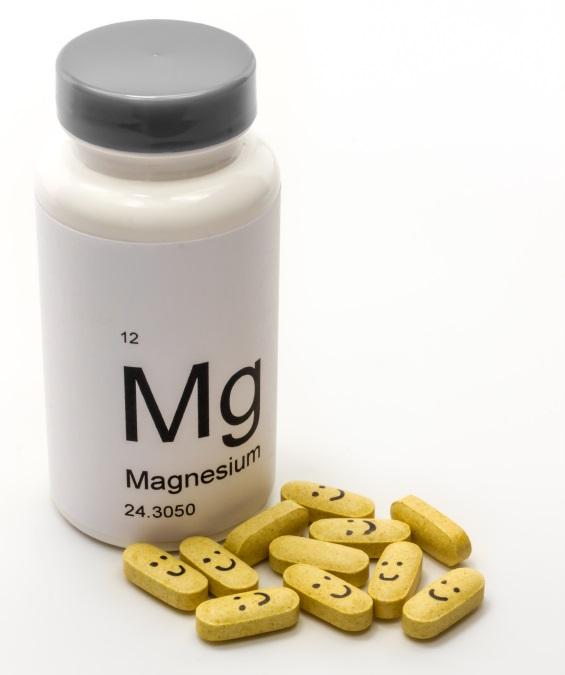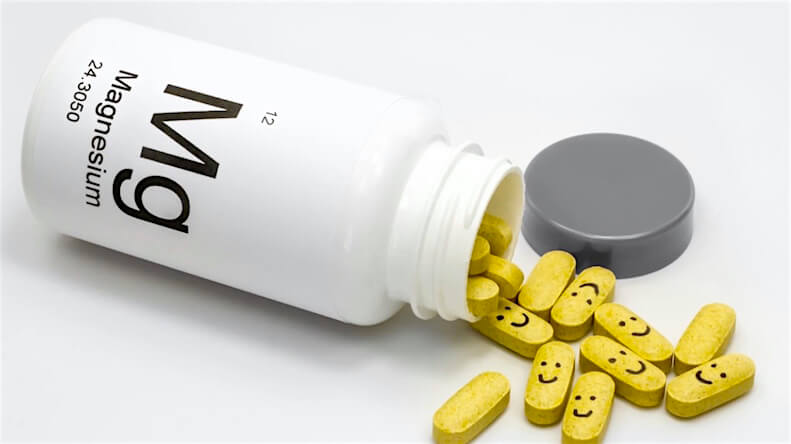
Over the years, numerous studies have hinted at a link between magnesium deficiency and the mood disorder depression. But clinical research has proven that magnesium can indeed decrease depression symptoms. The exact mechanism by which magnesium is able to accomplish this is considered more of a mystery, but previous magnesium research does offer a few clues.
We’ll start by discussing the magnesium and depression research studies that inspired this article and then move on to previous research studies that may illuminate how magnesium affects depression.
Magnesium Depression Research
Clinical researchers had already established that magnesium has an effect on the biological and transduction pathways implicated in the pathophysiology of depression. But the results of a study published in the journal Nutritional Neuroscience has demonstrated that magnesium can indeed decrease depression symptoms. It was not, however, determined if this was because those who were successfully treated with magnesium were depressed because they were magnesium deficient.
“A higher intake of dietary magnesium seems to be associated with lower depression symptoms though reverse causality cannot be excluded. … Magnesium seems to be effective in the treatment of depression but data are scarce and incongruous. Disturbance in magnesium metabolism might be related to depression. Oral magnesium supplementation may prevent depression and might be used as an adjunctive therapy.”1
The medical community has been aware of these studies for years now; yet, mainstream doctors are still not recommending magnesium to patients struggling with depression. When you consider that roughly half of all adults in the United States are magnesium deficient, and our bodies need magnesium to function, recommending magnesium supplements would seem like a no-brainer.
A study dating back to 2006 even suggested magnesium supplement types and dosage amounts for rapid recovery from major depression.
“Case histories are presented showing rapid recovery (less than 7 days) from major depression using 125-300 mg of magnesium (as glycinate and taurinate) with each meal and at bedtime. Magnesium was found usually effective for treatment of depression in general use. Related and accompanying mental illnesses in these case histories including traumatic brain injury, headache, suicidal ideation, anxiety, irritability, insomnia, postpartum depression, cocaine, alcohol and tobacco abuse, hypersensitivity to calcium, short-term memory loss and IQ loss were also benefited.”2
This study’s authors even recommended fortifying refined grains (which are almost completely stripped of their natural magnesium) and adding biologically available magnesium to municipal drinking water. Many cities in the United States do add magnesium (and other essential minerals) to the drinking water, but most do not add enough.
How Magnesium Affects the Nervous System
It’s long been established that magnesium is essential to nervous system health. Without it, our nervous system cannot function properly. Magnesium calms the nervous system and muscles, which includes the heart.
When we are magnesium deficient, our resting heart rate may increase, we may suffer from frequent muscle spasms and chronic pain, our sympathetic nervous system can become overactive and overworked. In addition, electrical activity in the brain is disrupted, which has been shown to negatively affect sleep. And sleep issues have been shown to be (at least partially) responsible for the mood disorders depression and anxiety in some patients.
“The link between sleep and mood has been seen over and over by researchers and doctors. For example, people with insomnia have greater levels of depression and anxiety than those who sleep normally. They are 10 times as likely to have clinical depression and 17 times as likely to have clinical anxiety. The more a person experiences insomnia and the more frequently they wake at night as a result, the higher the chances of developing depression.”3
Stress, the Double-Edged Sword
Stress is necessary for human survival. Stress keeps us alert and ready to respond to dangerous situations. A little stress is good for us, but too much is very bad. Among other issues, stress has been shown to trigger depression.
“Sustained or chronic stress, in particular, leads to elevated hormones such as cortisol, the “stress hormone,” and reduced serotonin and other neurotransmitters in the brain, including dopamine, which has been linked to depression. When these chemical systems are working normally, they regulate biological processes like sleep, appetite, energy, and sex drive, and permit expression of normal moods and emotions. When the stress response fails to shut off and reset after a difficult situation has passed, it can lead to depression in susceptible people.”4
To make matters worse, stress, all by itself, decreases magnesium stores in the body. So, it can become a vicious cycle. Under these circumstances, the only thing we can do to prevent depression or naturally decrease depression symptoms is to consume more magnesium-rich foods and supplements, if necessary.
If you have any questions or comments regarding magnesium and/or depression comment below or tweet me on Twitter.
References
1Derom ML, Sayon-Orea C, et al. “Magnesium and Depression: A Systemic Review”. Nutritional Neuroscience, September 2013. Web. April 2018
2Eby GA and Eby KL. “Rapid recovery from major depression using magnesium treatment”. Medical Hypotheses, March 20, 2006. Web. April 2018
3“The Complex Relationship Between Sleep, Depression & Anxiety”. Natural Sleep Foundation, n.d. Web. April 2018
4Bruno, Karen. “Stress and Depression”. WebMD, n.d. Web. April 2018
Langley WF and Mann D. “Central Nervous System Magnesium Deficiency”. Archives of Internal Medicine, March 1991. Web. April 2018
Janet Renee, MS, RD. “Can a Magnesium Deficiency Cause a Rapid Heart Rate?” Livingstrong.com, September 11, 2017. Web. April 2018
Admin. “Magnesium – How it affects your sleep”. The Sleep Doctor, November 20, 2017. Web. April 2018
Gilbert, Robin. “Magnesium Deficiency & Nerves”. Livestrong.com, October 3, 2017. Web. April 2018

